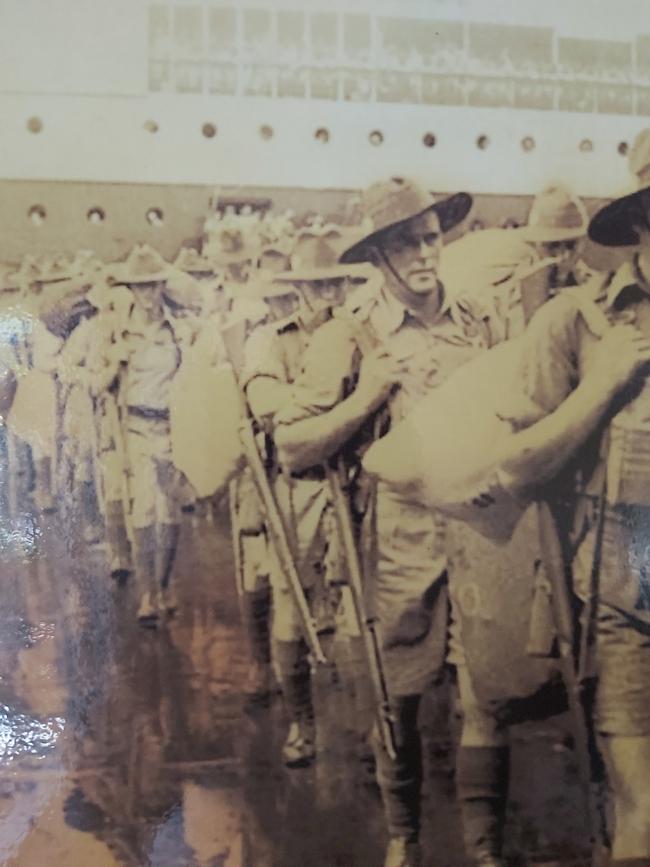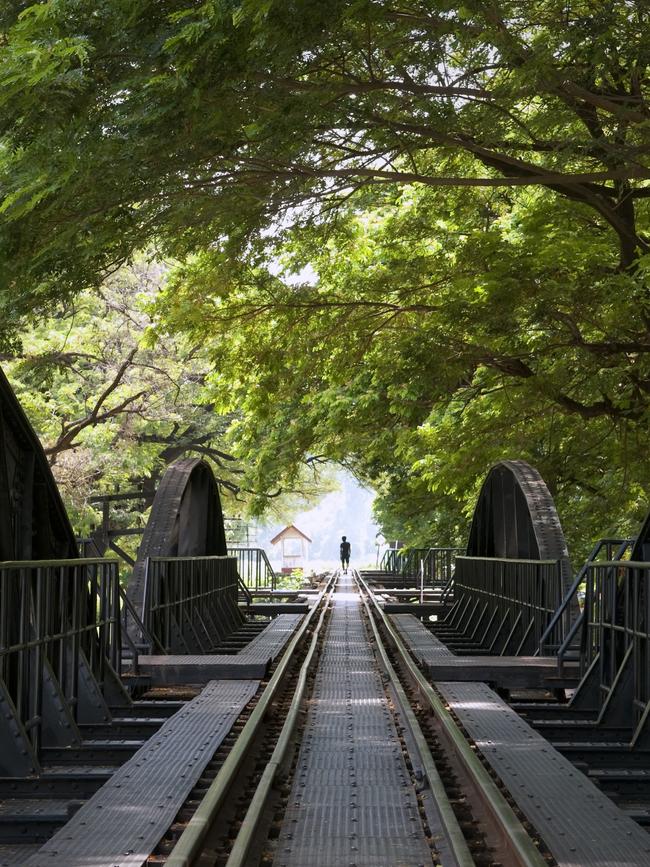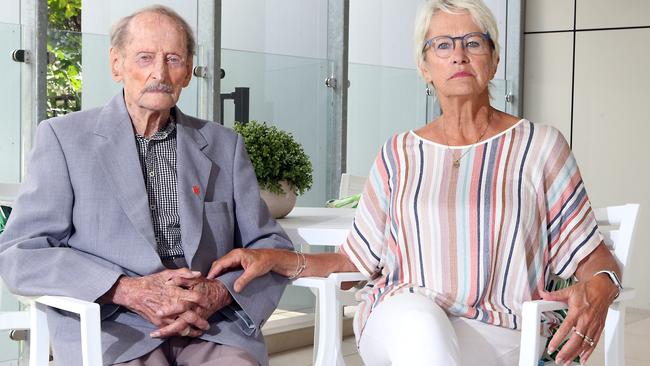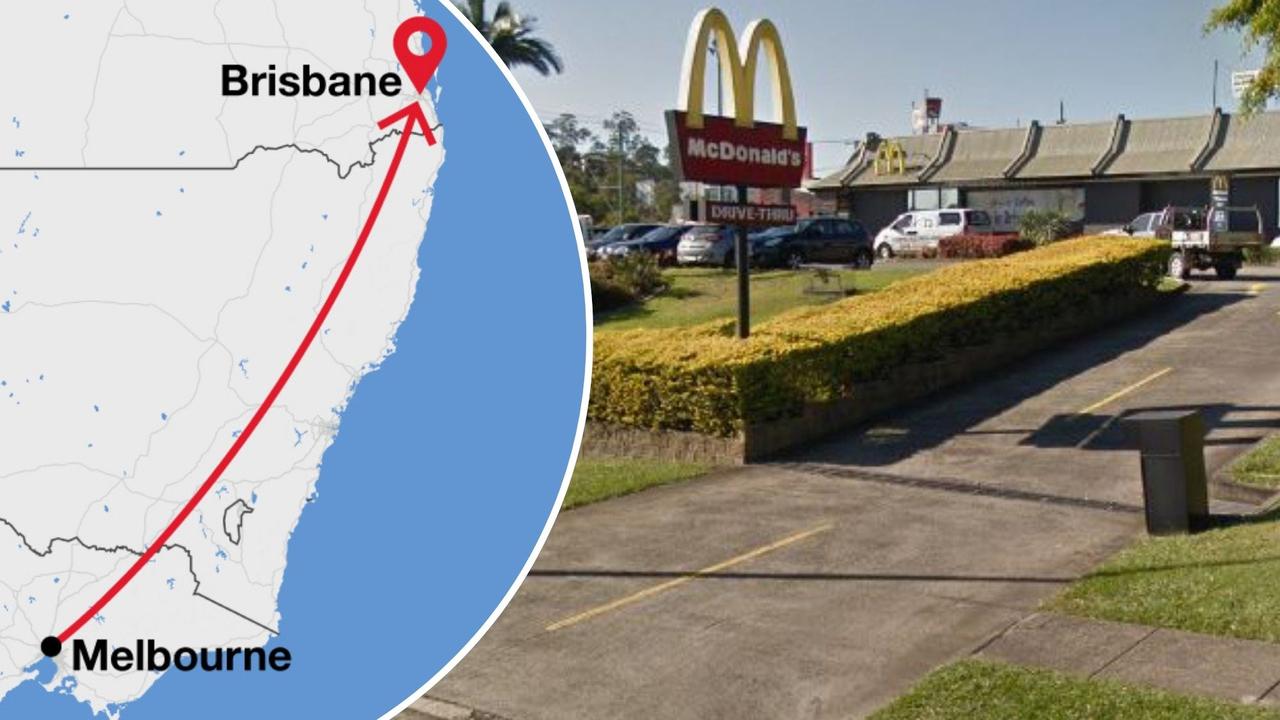Family of 100yo war vet Gordon Jamieson pleads with Coast to get vaccinated so he can be free
At the ripe old age of 100 Gordon Jamieson is one of the country’s last surviving WWII POW vets. But the actions of anti-vaxxers have seen him locked up – or in – all over again.

Gold Coast
Don't miss out on the headlines from Gold Coast. Followed categories will be added to My News.
ALMOST 80 years ago, Gordon Jamieson was captured by the Imperial Japanese Army and imprisoned for more than three years, forced to labour on the notoriously cruel Thai-Burma railway where tens of thousands were worked to death.
Now, at the age of 100, he is one of Australia’s last surviving World War II POW veterans, but the actions of anti-vaxxers have seen him locked up – or locked in – all over again, and his family are pleading for the city to get fully vaccinated.

Do it for Gordon.
The Mudgeeraba resident is already double-vaccinated himself.
After all, what’s a needle compared to the torture, starvation and slavery he once endured to protect his country?
But his daughter Paula Neill says Gordon, who lives at Carinity Cedarbrook Aged Care, is paying the price for those who refuse to take the jab.
“Dad has been in lockdown multiple times, aged care residents have really done it tough,” says Paula.
“Covid has been awful for them. We’ve gone weeks without seeing Dad, and it’s been tough on his mental health. In the last year, his mental state has deteriorated.
“He’s vaccinated and so are we, but while there is a risk in the general population, lockdowns will keep happening to him for the protection of the residents.

“I understand that but it’s so hard to watch. The vaccination rate has been so slow.
“It breaks my heart that people are dragging their feet when it’s my dad they should be trying to protect. He put his life on the line for this country and paid the price, but now he’s the one who loses his freedom because they’re so worried about their own.”
Paula says her family, including her older brother Chris and younger sister Jeanette, have been especially offended by some of the anti-vax commentary likening the plight of the unvaccinated to Jewish people during the Holocaust.
She says few can understand what a threat to freedom really feels and looks like … but her father knows exactly what it is.
“When I think of the sacrifices that Dad made and the risks that he took, he lied about his age just so he could serve his country, and then to think that grown adults won’t take a needle for the protection of their own children, parents and grandparents … it really does make me angry,” she says.
“I have been so disappointed by the negativity and lies spread on social media by so many Australians.
“The fact that people don’t believe that Covid is real is mind-blowing. And then to liken themselves to the victims of the Holocaust … that’s just disrespecting everything that my father and so many Australians gave their lives for.”
Gordon’s own story began on June 14, 1921 when he was born in the little Queensland town of Amiens. While his memory is fading now, his family and carers have documented his story and words, which is also shared in Able Australia’s Seniors Book, released next week.
He was just 19 when he enlisted in July 1940 “to go on an adventure”. He was taken prisoner on 15 February, 1942 and liberated in September 1945, weighing just 40kgs.
“We became captives of the Imperial Japanese Army six months after arriving in Malaya and following a ten-week battle,” says Gordon.
“It was quite eerie when the din of gunfire and high explosives ceased, to be followed by the cheering of the enemy soldiers at close proximity.
“We became slaves and thus began, unexpectedly, a 42-month phase of my life, a period of tragic events the memories of which will remain for all time.”
Gordon says the POWs would work 18-hour shifts building embankments, bridging creeks and digging cuttings with picks and shovels. Only five of his platoon survived the war.
He says despite the nightmare reality of working on the Burma-Thailand railway, he remembered the kindness and generosity of spirit of his fellow prisoners – as well as the dark humour and laughter.

He says that if a man lost his mate, another would “adopt you”, and friendships formed in those camps lasted the rest of their lives … even if he is one of the few still living.
“On the completion of a strenuous day at work our boys would commence the walk back to camp, several kilometres in pouring rain with little or no footwear,” he says.
“Then someone would start to sing a tune... and others would follow, and the heads would be lifted proudly.”
Paula says no matter his age, Gordon will never forget his wartime experiences.
She says that became explicitly clear when he was asked to attend as a guest of honour at the Ipswich set of the 2013 film The Railway Man, starring Nicole Kidman and Colin Firth, which detailed the story of a British POW in a Japanese camp working on the Thai-Burma Railway.
“Dad would never talk much about the war in the early days. He met Mum after he got home and we were born later. When he did talk to us about it, he only ever relayed the nicer parts of what happened.
“But the trauma, even though it wasn’t understood back then, it was real.


“I remember when he was invited on to the set of The Railway Man, he was in his 90s then, he understood what was happening and he was interested in it all.
“But the strangest thing was when we got there, he was watching his step as he got out of the car, and when he looked up he saw one of the cast members – a really skinny guy in shorts, he was playing a POW - and Dad just grabbed his hand and said ‘are you OK, mate?’ In his mind, he was back there for a moment, and that’s how they were. Mates until the end, looking out for each other.
“It broke my heart but it also warmed it. It was such a special day for Dad, he was treated like royalty.”
While living in Mudgeeraba now, Gordon and his family lived for decades in the heart of Broadbeach when it was still a quiet, low-rise suburb. He met his wife of 62 years, Shirley, on the Gold Coast and he ran an engineering business with his father until he retired in the 1980s.
Paula says even when he stopped working, he never stopped – travelling to Thailand and Japan to take part in commemorative ceremonies that honoured prisoners of war and lobbying the Australian and Japanese governments for reparations for prisoners of war.
“Mum and Dad were true loves until the end. She passed away 10 years ago and we’re all surprised he’s lived so long now without her,” says Paula.
“Even now, he’ll sometimes forget that she’s gone and go looking for her.
“She was by his side always, especially when he became extremely ill in the 1980s. It was actually a long-term war-related injury that became very acute. He spent weeks in the ICU and nearly died – but he’s a fighter, he always has been.
“He says the reason he’s lived so long is because in the POW camp they were given a bowl of rice every day, and he’d always eat the maggots – he says the protein got him through.
“He always has that sense of humour and positive attitude … and most of all, he’s community-minded. When he got involved in reparations for the POWs, it was never for money – at least, not money for himself.

“He wanted to raise money to build a tropical disease centre in Townsville. Unfortunately, the political machinery of it all fell through. When I heard about the new malaria vaccine now available, I know that Dad would have loved to have been in some way responsible for that.”
Yet when it comes to Covid immunisations, as angry as anti-vaxxers might make her, Paula says her own father is more forgiving.
“I am so proud of my father, but one of the things that I admire the most is that despite the trauma he endured, he never ever held a grudge against the Japanese.
“To him, they were all just young boys doing what they were told. I honestly believe it’s that forgiving, accepting mindset of his that has given him such a long life.
“Even now, when he is bearing the brunt of Covid and lockdowns, when he is losing the last years of his life to isolation, he forgives.”
And that’s why when it comes to getting vaccinated, forget the excuses. Just do it.
Do it for Gordon.
More Coverage
Originally published as Family of 100yo war vet Gordon Jamieson pleads with Coast to get vaccinated so he can be free




